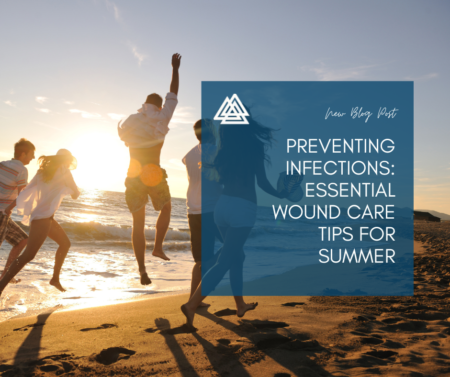 Summer is the season of outdoor activities, adventures, and fun in the sun. Whether you’re hiking, swimming, or just enjoying a picnic, the chances of minor injuries like cuts, scrapes, and insect bites increase. Proper wound care is crucial to prevent infections, which can quickly turn a small injury into a significant health issue. Here are some essential wound care tips to keep you and your loved ones safe and healthy during the summer months.
Summer is the season of outdoor activities, adventures, and fun in the sun. Whether you’re hiking, swimming, or just enjoying a picnic, the chances of minor injuries like cuts, scrapes, and insect bites increase. Proper wound care is crucial to prevent infections, which can quickly turn a small injury into a significant health issue. Here are some essential wound care tips to keep you and your loved ones safe and healthy during the summer months.
Clean the Wound Immediately
The first step in preventing infection is to clean the wound as soon as possible. Rinse the area with clean, running water to remove dirt and debris. Use mild soap to gently clean around the wound, but avoid getting soap directly in the wound, as it can irritate the tissue. If you have access to a saline solution, it can be an excellent alternative for wound cleaning.
Stop the Bleeding
If the wound is bleeding, apply gentle pressure with a clean cloth or sterile gauze until the bleeding stops. Elevating the injured area can also help reduce blood flow. For minor cuts and scrapes, bleeding usually stops within a few minutes. If it doesn’t, seek medical attention as it could indicate a more severe injury.
Apply an Antiseptic
After cleaning the wound, apply an antiseptic solution or ointment to help prevent infection. Common antiseptics include hydrogen peroxide, iodine, or antibiotic creams like Neosporin. These products help kill bacteria and create a barrier against further contamination. Be cautious with hydrogen peroxide and iodine, as they can be harsh on the skin if used excessively.
Cover the Wound
Keeping the wound covered helps protect it from dirt, bacteria, and further injury. Use a sterile bandage or dressing that is appropriate for the size and location of the wound. For small cuts and scrapes, adhesive bandages work well, while larger wounds may require gauze and medical tape. Change the dressing daily or whenever it becomes wet or dirty.
Keep the Wound Moist
Contrary to the old belief that wounds heal better when they are dry, research shows that a moist healing environment can promote faster healing and reduce the risk of infection. Using an antibiotic ointment or a specialized wound gel can help keep the wound moist and facilitate the healing process.
Monitor for Signs of Infection
Even with proper care, it’s essential to monitor the wound for signs of infection. Symptoms of an infected wound include increased redness, swelling, warmth, pus or discharge, and worsening pain. Fever and swollen lymph nodes are also signs of a more severe infection. If you notice any of these symptoms, seek medical attention promptly.
Avoid Swimming in Contaminated Water
Swimming in lakes, rivers, and even some public pools can expose open wounds to harmful bacteria. If you have an open wound, it’s best to avoid swimming in these waters until the wound has fully healed. If swimming is unavoidable, waterproof bandages can provide some protection, but they are not foolproof.
Stay Hydrated and Maintain Good Nutrition
Proper hydration and nutrition play a crucial role in wound healing. Drink plenty of water and eat a balanced diet rich in vitamins and minerals, especially vitamin C and zinc, which are essential for skin repair. Staying hydrated helps maintain skin elasticity and supports overall health, which is vital for effective healing.
Use Sunscreen
If your wound is on a part of your body exposed to the sun, protect it with sunscreen once it has started to heal. Sun exposure can cause the healing skin to darken and scar more noticeably. Use a broad-spectrum sunscreen with at least SPF 30, and reapply it regularly.
Keep Your Tetanus Vaccination Up to Date
Tetanus is a serious infection caused by bacteria that can enter the body through cuts and wounds. Make sure your tetanus vaccination is up to date, as it provides essential protection against this potentially deadly disease. Tetanus boosters are typically recommended every 10 years.
Preventing infections through proper wound care is essential, especially during the summer when outdoor activities can increase the risk of minor injuries. By following these tips, you can ensure that small wounds remain just that—small. Remember, clean, cover, and monitor your wounds to enjoy a safe and healthy summer season. Stay prepared, and don’t let a minor injury spoil your summer fun!

